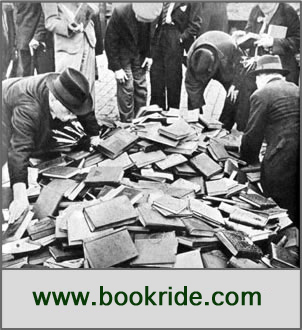
This is the second part and deals mainly with auctions. I will do a third part with some so far omitted terms, some fanciful, such as Gopwo, Manfer,The Ventura Wave, Relister, Roastbeef, 'defended', underpinned, tea chests, follow the flag, end user, Corita effect etc.,
B.I. Bought in. When an item fails to meet its reserve it is said to be 'bought in.' Often the result of overvaluing the item due to the demands of an over ambitious or greedy consigner. Not always easy at the time to tell this has happened. One waggish London auctioneer would signal the event by giving the buyer a fictitious name, almost invariably that of an Italian film director -- Antonioni, Fellini, Rossellini etc.,
Dotheboys. Sotheby's Auction House. From the awful school in Dickens Nicholas Nickleby run by Mr Wackford Squeers.
Drop. When one bidder takes an item to a highish price but suddenly and unexpectedly stops bidding he is said to have 'dropped it on' the other bidder. 'I took it to £1800 and dropped it on him at £2000.'
House Sale. An auction that takes place on the premises of a house, often in a marquee on the lawn. Usually quite grand houses and often well publicised with helicopters landing in the fields and car parks full of Rollers and Range Rovers + the odd muddy Volvo. Great books have been found in these sales but one also sees some very silly prices paid by rich types seduced by the classy ambience. Sometimes the books are in large lots and we attempt to buy them. A large collection of Malthus letters (found in a bread bin) were bought for a song at a house sale circa 1990. House Sales sometimes contain items from other properties which have been placed there by wily auctioneers hoping to cash in on house auction mania. This isknown as 'salting.'
The Juice. Auctioneer's commission, now running at a salty 20% at most major rooms.
The Knock. Also known as 'The Ring'. An informal (and illegal) agreement between dealers whereby they do not bid against one another during an auction and afterwards 'knock' the goods out in a second auction. The increase in price, sometimes considerable, is shared out between the dealers .The share is known as a 'dividend' or 'divvy.' A dealer who merely joins this arrangement to receive the dividend and has no real intention of buying is known as a 'divvy chaser.' The 'Ring' was made illegal in UK in 1927. Outlawed by trade organisations and far less widespread in the 21st Century. There is a very good study of it in its legal days by Arthur & Ing Freeman: Anatomy of an Auction: Rare Books at Ruxley Lodge, 1919. The practice is also examined in the excellent novel 'Knock or Ring' by Michael Nelson (1957). Adam Smith in his 'Wealth of Nations' noted that "people of the same trade seldom meet together...(without the talk resulting in) ...a conspiracy against the public, or in some contrivance to raise prices." In the case of the ring, of course, the conspiracy is to lower prices.*
Pissing Contest. When two people, usually dealers bid one another up to a remarkably high price, sometimes leaving themselves with very little profit. " I dropped out early, I didn't want to get involved in a pissing contest.' Sometime 'Pissing Competition.'
Salt. See House Sale.
Settle. To join in a ring or knock - sometimes known as 'the settlement.'
Shill Bid. A fake bid placed to increase the price of an item in an auction - often placed by the seller himself or an associate. Mainly an ebay word now. Ebay have sophisticted software to detect this banned practice.
Snipe. Another Ebay word. To place a bid at the very last moment, sometimes within the last 10 seconds of an auction. This is an attempt, often successful, to 'win' the auction by not allowing the opposition to come back with a higher bid. A practice so common that software is available to do it for you --powersnipe, bidnapper etc., The word 'win' is considered naff when used at terrestrial auctions but quite suits the victorious feeling of the successful ebay sniper.
Taking bids off the wall. When an auctioneer keeps the bidding going often against just one enthusiastic bidder, eventually dropping the item on the unfortunate person. The bids appear to be coming from behind the bidder but in fact are 'taken off the wall.' Hard to detect but one sign is that sometimes the auctioneer is ahead of you in the bidding and when you stop bidding he falls back by one bid (say from £110 to £100) to knock the item down to you. This is known as 'leading the bidding.' Not unknown in Sussex.
The Rooms. Auction rooms. 'The last copy I saw was in the rooms.'
*The origin of the word presumably comes from the fact of the participants sitting or standing in a sort of circle. However in John Badcock's (Jon Bee) 1823 'Lexicon Balatronicum. Slang, a Dictionary of the Turf, the Ring, the Chase, the Pit (and the) Bon-Ton' we find this entry "The Rig: In auction sales, the dealers agree not to bid against each other, buy low and afterwards re- sell the same, by a mimick auction --called 'Knock - Out.' " This is not a misprint and to add to the confusion the 'ring' in the title of Badcock's book refers to the boxing ring (where you can get knocked out!)


No comments:
Post a Comment